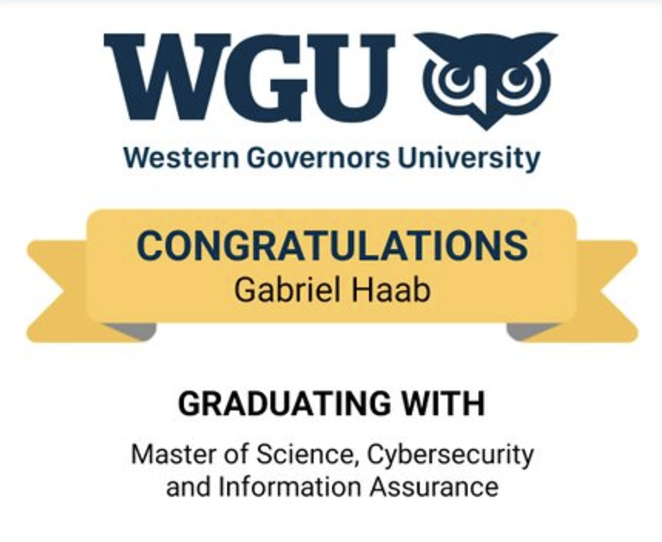WGU MSCIA: My Journey and Key Takeaways

I wanted to share my experience with the WGU Master of Science in Cybersecurity and Information Assurance (MSCIA) program in hopes that it might help someone considering this path. My journey wasn’t perfect, but I learned a lot, and I completed the entire program in just six months. If you’re thinking about taking the plunge into this program or wondering how to succeed in such a short timeframe, I hope this post provides some useful insights.
Before starting the MSCIA program, I also took advantage of a sale from EC-Council for the CEH-Practical exam, which was $200 instead of the usual $550. This exam was relatively easy—just 20 practical questions, mostly focused on Nmap. Though I didn’t take the full CEH exam, the practical exam qualified me as a CEH holder, and also transferred to one course in the MSCIA program (the C701 - Ethical Hacking course).
The Challenge
Although I had a couple of years of experience in cybersecurity and some certifications (like CompTIA Security+, CySA+, and CEH Practical), the MSCIA program was a challenge in many ways. Most of the content was new to me, as the program is designed around the CISSP framework, which is more about governance, management, and risk than deep technical details.
One of the main challenges for me was balancing my full-time job, family obligations, and the program itself. But with a clear plan and the right mindset, I made it work.
Why Pursue a Master’s Degree?
Two main reasons made me decide to go after a Master’s degree:
- Stand Out in the Future: I wanted to set myself up for career advancement and ensure I had the qualifications to stand out in the competitive cybersecurity field.
- Tuition Reimbursement: My current employer offered tuition reimbursement, making the decision financially easier to pursue.
While I don’t expect immediate benefits (since most cybersecurity jobs require 3-5 years of experience), having the Master’s degree will help me as I gain more experience in the field. In the meantime, I’m also working on gaining additional certifications to further strengthen my resume.
How Did I Finish in 6 Months?
Here’s the secret: strategy, and a lot of time management. The program is competency-based, which means you move through the material at your own pace. There were 182 days from August 1 to January 30, and I needed to complete eight courses, which meant finishing at least one course every 22 days. Some courses were easier than others, so I factored that into my plan and kept a steady pace. Here’s how it looked:
- C700 - 26 days
- C725 - 10 days
- C702 - 21 days
- C727 - 19 days
- C795 - 11 days
- C706 - 6 days
- C726 - 60 days*
- C796 - 13 days
Total Time Spent: 166 days
Time to Spare: 182 - 166 = 16 days
Note: C726 wasn’t particularly difficult, but during that time, I had a lot of additional responsibilities that affected my study time.

Time Commitment: Is It Worth It?
In terms of time, I found this program to be very different from my bachelor’s experience. For my bachelor’s, I spent 2 to 5 hours a week on average to complete assignments, and I graduated with a 4.0 GPA. But, looking back, I felt the degree was more about fulfilling requirements than gaining meaningful skills.
In contrast, throughout the MSCIA program, I studied 12 to 15 hours a week (~2 hours a day). This was enough for me to pass every Objective Assessment (OA) and Performance Assessment (PA) on the first try, saving both time and money.
Tips for the OAs and PAs
Objective Assessments (OAs):
- Start with the pre-assessment.
- Read through the course material thoroughly.
- Use flashcards (Quizlet is a great tool).
- Re-do the pre-assessment and then take the OA.
- Celebrate afterward (maybe with a beer)!
Performance Assessments (PAs):
The key here is to think like a manager. You won’t always have all the information you need. When the scenario leaves you feeling uncertain, don’t overthink it. Consider what you would do if you had more data. For example, if a question asks how a company’s network was compromised, you could respond with something like: “Further investigation of the security logs is needed to identify the vulnerability” or “A forensic analyst could help analyze the logs to pinpoint the exploited weakness.”
Also, for the PA sections (A, B, C, etc.), I used draw.io to create visual representations of concepts when I didn’t want to keep repeating myself. I’d include a visual with my answer, referencing previous sections to keep it concise and clear.
Lastly, for writing assistance, Grammarly was a lifesaver. It helped me refine my writing, suggesting better word choices, sentence structure improvements, and grammar corrections.
Final Thoughts: Was It Worth It?
I really enjoyed the MSCIA program and am grateful for WGU’s competency-based learning model. Although I finished in six months, the program wasn’t a “rush to the finish” experience for me. I gained a deep understanding of cybersecurity from both a technical and managerial perspective, which will definitely serve me well as I continue to advance in my career.